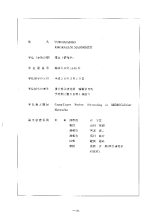Cross-layer packet scheduling in MIMO cellular networks MIMO無線ネットワークにおけるクロスレイヤ・パケットスケジューリング
Access this Article
Search this Article
Author
Bibliographic Information
- Title
-
Cross-layer packet scheduling in MIMO cellular networks
- Other Title
-
MIMO無線ネットワークにおけるクロスレイヤ・パケットスケジューリング
- Author
-
Torabzadeh Khorasani Masoomeh
- Author(Another name)
-
トラブザデフ コーラサン マスーメ
- University
-
総合研究大学院大学
- Types of degree
-
博士 (情報学)
- Grant ID
-
甲第1155号
- Degree year
-
2008-03-19
Note and Description
博士論文
We address the problem of cross-layer packet scheduling for the downlinks of multiple-input multiple-output(MIMO) cellular systems. Multiple-antenna wireless systems can improve the capacity and reliability of communications. To benefit the advantages, a packet scheduler should effectively allocate radio resources to users in a fair way. Previously proposed MIMO schedulers have problems such as ignoring traffic arrival process or complexity. <br /> In MIMO cellular networks, certain schedulers directly select among the available channels between users and the base station in a centralized way, referred to as centralized schedulers. Other schedulers have two independent phases: In the first phase, a group of users is selected based on the scheduler criterion, and in the second phase the selected users are assigned to the transmit antennas by using an assignment scheme taking into consideration capacity maximization. Two-phase schedulers can be implemented with lower complexity compared with the centralize schedulers. <br /> For two-phase schedulers, we focus on designing an adaptive fair scheduling algorithm to traffic load changes. We propose a multi-output fair queueing (MO-FQ) scheduler, which is based on a fair queueing algorithm with mechanisms for rate selection, compensation of lagging users, and virtual time system. Since some of the scheduler's system parameters are sensitive to the traffi load, we extend it to dynamically adjust them in a way with low complexity so the system performs better, referred to as the load adaptive multi-output fair queueing (LA-MO-FQ) scheduler. Furthermore, there are a few algorithms for the assignment of the selected group of users to the base station antennas that are too complex or fail to maximize the capacity. We propose four assignment schemes that can work with low complexity and achieve high system capacity. Our max-loss delete (MLD), <br />max-deviation delete (MDD), tight max-loss delete (TMLD), and max difference of top two (MDTT) assignment schemes take into account the behavior of MIMO systems with mobile users to achieve near-optimal system capacities. Furthermore, we also propose some formulac for the time and service fairness comparisons of two-phase MIMO schedulers in which a single user is assigned to a transmit antenna for whole time slot. <br /> Aforementioned scheduling algorithms are based on a MAC layer architecture in which the whole time-slot on each transmit channel is allocated to one user. We propose a packet scheduler called MIMO packet-by-packet generalized processor sharing (MPGPS) using an efficient packet-based MAC framework. The scheduler can provide fair access to the channels for users and is work conserving. It also compensates lagging users and <br />decreases the average delay of users. Furthermore, we propose a novel scheduler referred to as MIMO packet- based proportional fairness (MP-PF) ,that can provide low average delay of users with time and service fairness considerations. The scheduler can tradeoff between low average delay of users and time/service fairness and is work conserving. It is also based on a novel proportional fairness concept that takes the packet length, user <br />transmission rate, user backlogs, and user guarantees into consideration. We also propose two useful equations for time/service fairness comparisons of packet-by-packet MIMO schedulers in which more than one user can be assigned to each transmit antenna during each time-slot. <br /> Intensive simulation studies and system analysis considering the mobility of users and the traffic characteristics demonstrate the good performance of our schedulers and assignment schemes. Finally, we compare both the performance and fairness of our schedulers and assignment schemes with some famous existing schedulers and assignment schemes.
総研大甲第1155号
